
Financial Statements
Independent auditor’s report
To the Shareholders of MCB Group Limited
Report on the Audit of the Consolidated and Separate Financial Statements
Our Opinion
What we have audited
MCB Group Limited’s accompanying consolidated and separate financial statements comprise:
- the statements of financial position as at 30 June 2019;
- the statements of profit or loss for the year then ended;
- the statements of comprehensive income for the year then ended;
- the statements of changes in equity for the year then ended;
- the statements of cash flows for the year then ended; and
- the notes, comprising significant accounting policies and other explanatory information.
Certain required disclosures have been presented elsewhere in the risk and capital management report, rather than in the notes to the consolidated and separate financial statements. These disclosures are cross-referenced from the consolidated and separate financial statements and are identified as audited.
Basis for Opinion
We conducted our audit in accordance with International Standards on Auditing (ISAs). Our responsibilities under those standards are further described in the “Auditor’s Responsibilities for the Audit of the Consolidated and Separate Financial Statements” section of our report.
We believe that the audit evidence we have obtained is sufficient and appropriate to provide a basis for our opinion.
Independence
We are independent of the Group in accordance with the International Ethics Standards Board for Accountants’ Code of Ethics for Professional Accountants (IESBA Code). We have fulfilled our other ethical responsibilities in accordance with the IESBA Code.
Key Audit Matters
Key audit matters relating to the consolidated financial statements
How our audit addressed the key audit matters relating to the consolidated financial statements
Impairment of loans and advances and debt instruments carried at fair value through other comprehensive income - application of IFRS 9 and estimates used in the calculation
As from 01 July 2018, the Group has applied IFRS 9 ‘Financial Instruments’ which requires the recognition of Expected Credit Losses (‘ECL’) rather than incurred credit losses.
The determination of ECL requires a fundamentally new and highly judgemental approach and relies on complex modelling and the use of a number of data points to determine the ECL on its stage 1 and stage 2 financial assets. The data has been sourced from a number of systems that have not been used previously for the preparation of accounting records. This increases the risk around completeness and accuracy of certain data used to create assumptions and operate the models.
Management is required to determine the ECL that may occur over either a 12-month period or the remaining life of a financial asset, depending on the categorisation of the individual asset.
Given the complexity of the PD, EAD and LGD models used for the ECL calculation, our actuarial expert team assisted us in performing certain procedures. With the assistance of our actuarial expert team, we assessed the input assumptions applied within those models by agreeing the key inputs used therein to the supporting documentation and independent extraction made from the system. The reasonableness of the forward looking information were independently verified, on a sample basis, to external sources.
Further, our procedures included assessing the appropriateness of stage 1 and stage 2 of the ECL model through independent re-performance and validation procedures. In addition, we tested the integrity of critical data used at year end to calculate ECL by verifying these to the relevant systems. We performed risk based substantive testing of the models, including independently rebuilding certain assumptions.
Key audit matters relating to the consolidated financial statements
The Group also applied judgement and estimates in determining the impairment provision on its stage 3 financial assets to estimate the loss event and the amount and timing of their expected future cash flows. The key areas of significant management judgements and estimates within the ECL calculations include:
- Input assumptions applied to estimate the probability of default (“PD”), exposure at default (“EAD”) and loss given default (“LGD”) within the ECL measurement;
- Evaluation of significant increase in credit risk (“SICR”);
- Incorporation of macro-economic inputs and forward looking information into the SICR assessment and ECL measurement; and
- Assessment of ECL raised for stage 3 exposures.
The application of IFRS 9 by the Group along with its impact on the opening balances has been disclosed in notes 2(d), 3(b) and 20 to the consolidated financial statements
How our audit addressed the key audit matters relating to the consolidated financial statements
For ECL calculated for stage 3 financial assets, we considered the significant financial difficulty of the Group’s customers and number of days in arrears for repayment. We also considered the assumptions applied by the directors in their assessment of the recoverability of the exposure. We independently recalculated the ECL, on a sample basis, based on our assessment of the expected cash flows and recoverability of collateral at an individual counterparty level.
Where collaterals were used, we assessed, on a sample basis, the reasonableness of the time taken into account to realise those collaterals and the objectivity and qualifications of the respective independent appraisers.
Key audit matters relating to the consolidated financial statements
Valuation of unquoted financial assets held at fair value
MCB Group Limited’s subsidiaries have invested in several listed and unlisted investments. The fair values of the subsidiaries’ unlisted investments are determined by applying different valuation methodologies.
Management makes significant judgements because of the complexity of the techniques and assumptions used in valuing the level 3 investment securities given the limited external evidence and unobservable market data available to support the Group’s valuation.
Due to the magnitude of the investments, the estimation uncertainties in the assumptions, and the degree of judgement required, the assessment of the fair value of the underlying investment in the subsidiaries is considered to be a matter of most significance to our audit.
See note 2(b), 3(d) and 7(d) to the consolidated financial statements.
How our audit addressed the key audit matters relating to the consolidated financial statements
We assessed the design and operating effectiveness of the Group’s key controls supporting the identification, measurement and oversight of valuation risk of financial assets.
For the more judgemental valuations, which depend on unobservable inputs, we evaluated the assumptions, methodologies and models used by the Group.
We performed an independent valuation of a sample of positions.
We tested that the valuation techniques adopted reflect the best appropriate basis for valuation of the investments.
We also involved our valuation experts to assess the appropriateness of the methodologies used.
In connection with the separate financial statements, we have determined that there are no key audit matters to communicate in our report.
Other Information
The directors are responsible for the other information. The other information comprises the information included in the annual report but does not include the consolidated and separate financial statements and our auditor’s report thereon.
Our opinion on the consolidated and separate financial statements does not cover the other information and we do not express any form of assurance conclusion thereon.
In connection with our audit of the consolidated and separate financial statements, our responsibility is to read the other information identified above and, in doing so, consider whether the other information is materially inconsistent with the consolidated and separate financial statements or our knowledge obtained in the audit, or otherwise appears to be materially misstated.
If, based on the work we have performed on the other information, we conclude that there is a material misstatement of this other information,we are required to report that fact. We have nothing to report in this regard.
In addition to the responsibilities described above and our work undertaken in the course of the audit, the Financial Reporting Act 2004 requires us to report certain matters as described below.
Corporate Governance Report
Responsibilities of the Directors for the Consolidated and Separate Financial Statements
The directors are responsible for the preparation and fair presentation of the consolidated and separate financial statements in accordance with International Financial Reporting Standards and in compliance with the Mauritian Companies Act 2001, and for such internal control as the directors determine is necessary to enable the preparation of consolidated and separate financial statements that are free from material misstatement, whether due to fraud or error.
In preparing the consolidated and separate financial statements, the directors are responsible for assessing the Group’s and the Company’s ability to continue as a going concern, disclosing, as applicable, matters related to going concern and using the going concern basis of accounting unless the directors either intend to liquidate the Group and/or the Company or to cease operations, or have no realistic alternative but to do so.
The directors are responsible for overseeing the Group’s and Company’s financial reporting process.
Auditor’s Responsibilities for the Audit of the Consolidated and Separate Financial Statements
Our objectives are to obtain reasonable assurance about whether the consolidated and separate financial statements as a whole are free from material misstatement, whether due to fraud or error, and to issue an auditor’s report that includes our opinion. Reasonable assurance is a high level of assurance, but is not a guarantee that an audit conducted in accordance with ISAs will always detect a material misstatement when it exists. Misstatements can arise from fraud or error and are considered material if, individually or in the aggregate, they could reasonably be expected to influence the economic decisions of users taken on the basis of these consolidated and separate financial statements.
As part of an audit in accordance with ISAs, we exercise professional judgement and maintain professional scepticism throughout the audit. We also:
- Identify and assess the risks of material misstatement of the consolidated and separate financial statements, whether due to fraud or error, design and perform audit procedures responsive to those risks, and obtain audit evidence that is sufficient and appropriate to provide a basis for our opinion. The risk of not detecting a material misstatement resulting from fraud is higher than for one resulting from error, as fraud may involve collusion, forgery, intentional omissions, misrepresentations, or the override of internal control.
- Obtain an understanding of internal control relevant to the audit in order to design audit procedures that are appropriate in the circumstances, but not for the purpose of expressing an opinion on the effectiveness of the Group’s and Company’s internal control.
- Evaluate the appropriateness of accounting policies used and the reasonableness of accounting estimates and related disclosures made by the directors.
- Conclude on the appropriateness of the directors’ use of the going concern basis of accounting and, based on the audit evidence obtained, whether a material uncertainty exists related to events or conditions that may cast significant doubt on the Group’s and Company’s ability to continue as a going concern. If we conclude that a material uncertainty exists, we are required to draw attention in our auditor’s report to the related disclosures in the consolidated and separate financial statements or, if such disclosures are inadequate, to modify our opinion. Our conclusions are based on the audit evidence obtained up to the date of our auditor’s report. However, future events or conditions may cause the Group and/or the Company to cease to continue as a going concern.
- Evaluate the overall presentation, structure and content of the consolidated and separate financial statements, including the disclosures, and whether the consolidated and separate financial statements represent the underlying transactions and events in a manner that achieves fair presentation.
- Obtain sufficient appropriate audit evidence regarding the financial information of the entities or business activities within the Group to express an opinion on the financial statements. We are responsible for the direction, supervision and performance of the Group audit. We remain solely responsible for our audit opinion.
We communicate with the directors regarding, among other matters, the planned scope and timing of the audit and significant audit findings, including any significant deficiencies in internal control that we identify during our audit.
We also provide the directors with a statement that we have complied with relevant ethical requirements regarding independence, and to communicate with them all relationships and other matters that may reasonably be thought to bear on our independence, and where applicable, related safeguards.
From the matters communicated with the directors, we determine those matters that were of most significance in the audit of the consolidated and separate financial statements of the current period and are therefore the key audit matters. We describe these matters in our auditor’s report unless law or regulation precludes public disclosure about the matter or when, in extremely rare circumstances, we determine that a matter should not be communicated in our report because the adverse consequences of doing so would reasonably be expected to outweigh the public interest benefits of such communication.
Report on Other Legal and Regulatory Requirements
Mauritian Companies Act 2001
The Mauritian Companies Act 2001 requires that in carrying out our audit we consider and report to you on the following matters. We confirm that:
- we have no relationship with or interests in the Company or any of its subsidiaries other than in our capacity as auditor of the Company and some of its subsidiaries, tax and business advisors of one of its subsidiaries and dealings in the ordinary course of business with some of its subsidiaries;
- we have obtained all the information and explanations we have required; and
- in our opinion, proper accounting records have been kept by the Company as far as appears from our examination of those records.
Other Matter
This report, including the opinion, has been prepared for and only for the Company’s shareholders, as a body, in accordance with Section 205 of the Mauritian Companies Act 2001 and for no other purpose. We do not, in giving this opinion, accept or assume responsibility for any other purpose or to any other person to whom this report is shown or into whose hands it may come save where expressly agreed by our prior consent in writing.
27 September 2019
Statement of Accounts
-
Financial Position
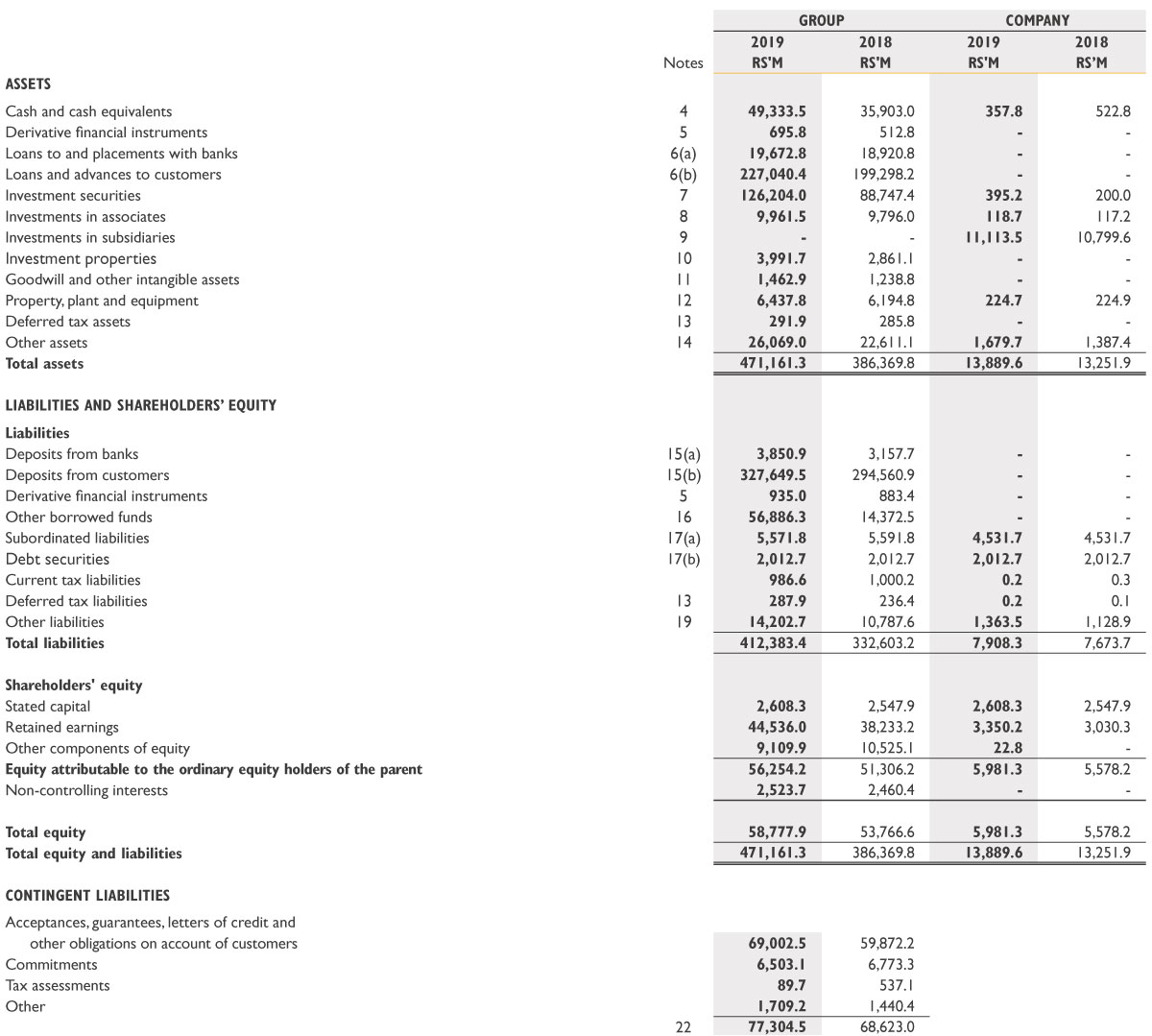
-
Profit and Loss
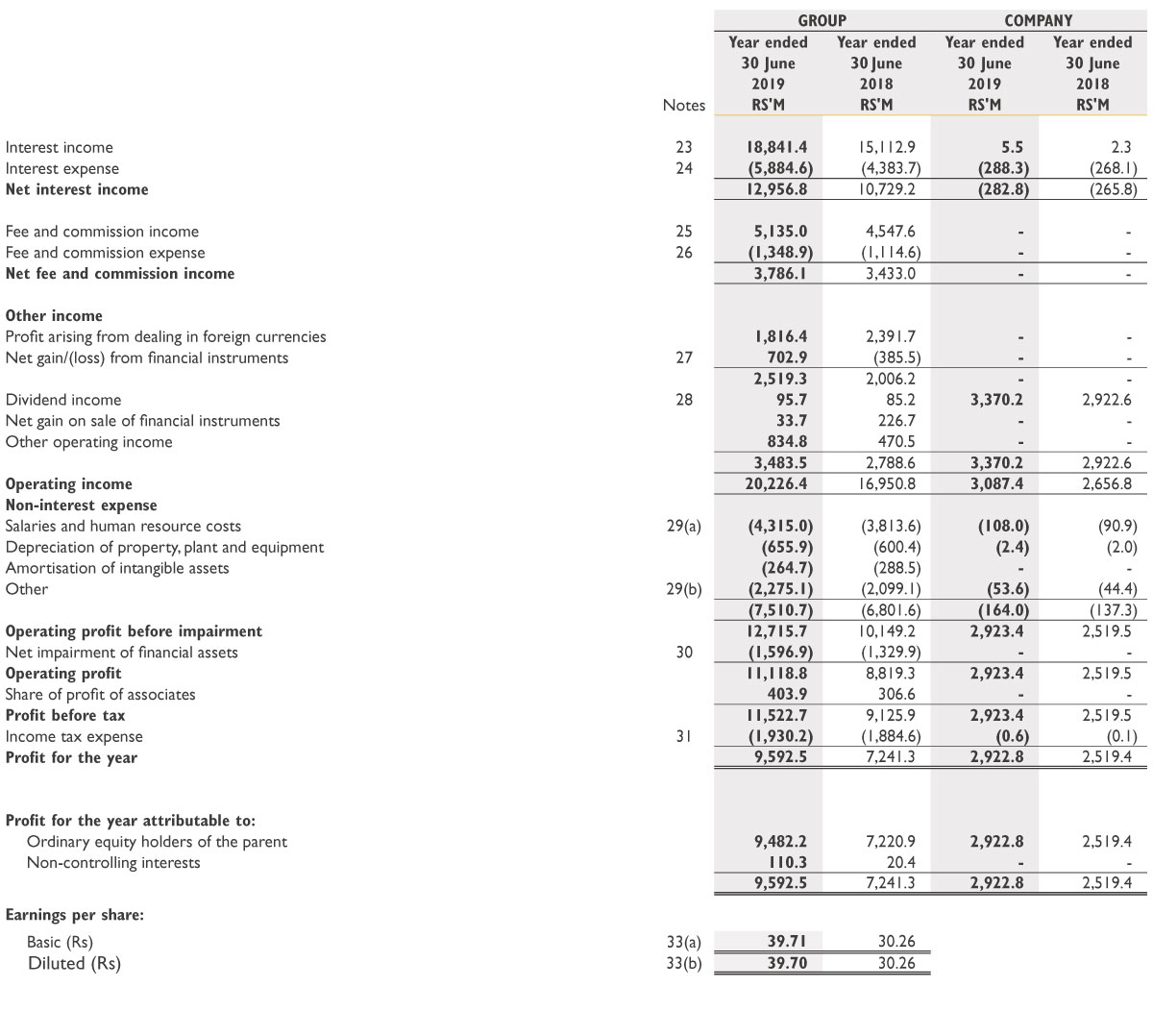
-
Comprehensive Income
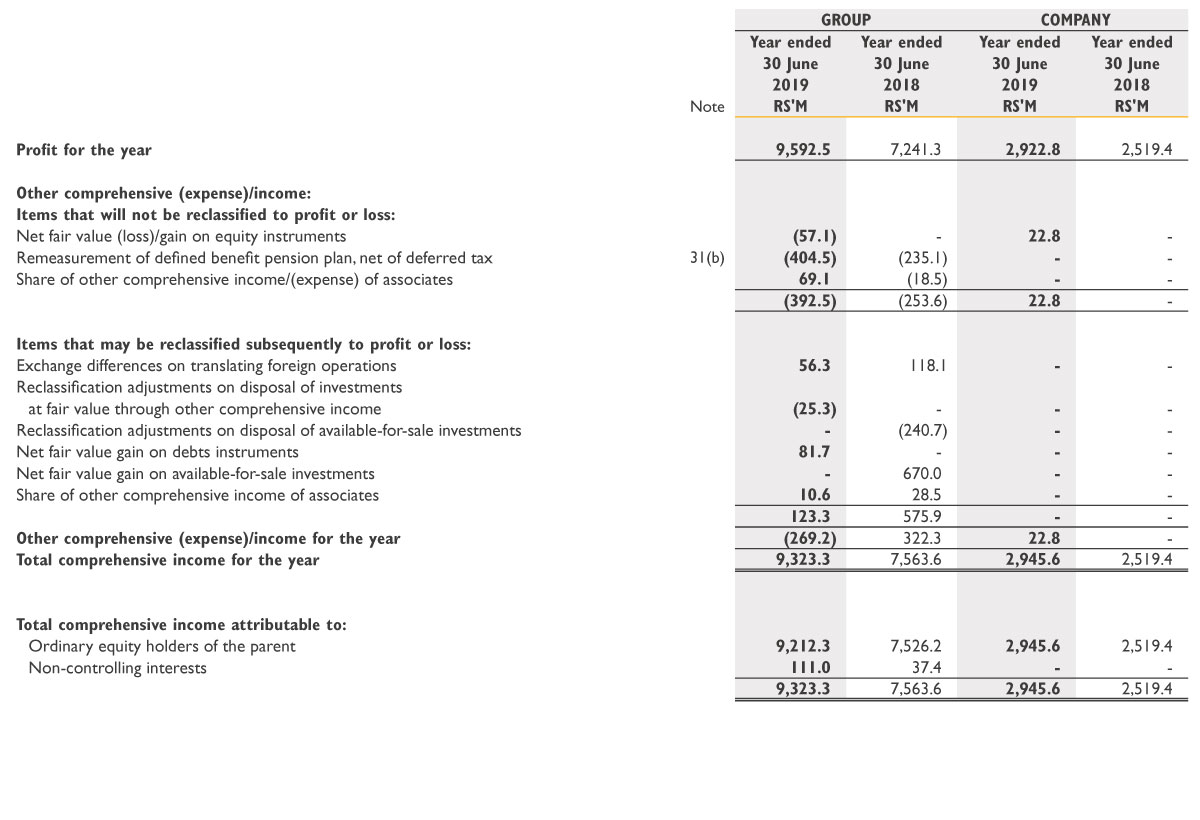
-
Changes in Equity
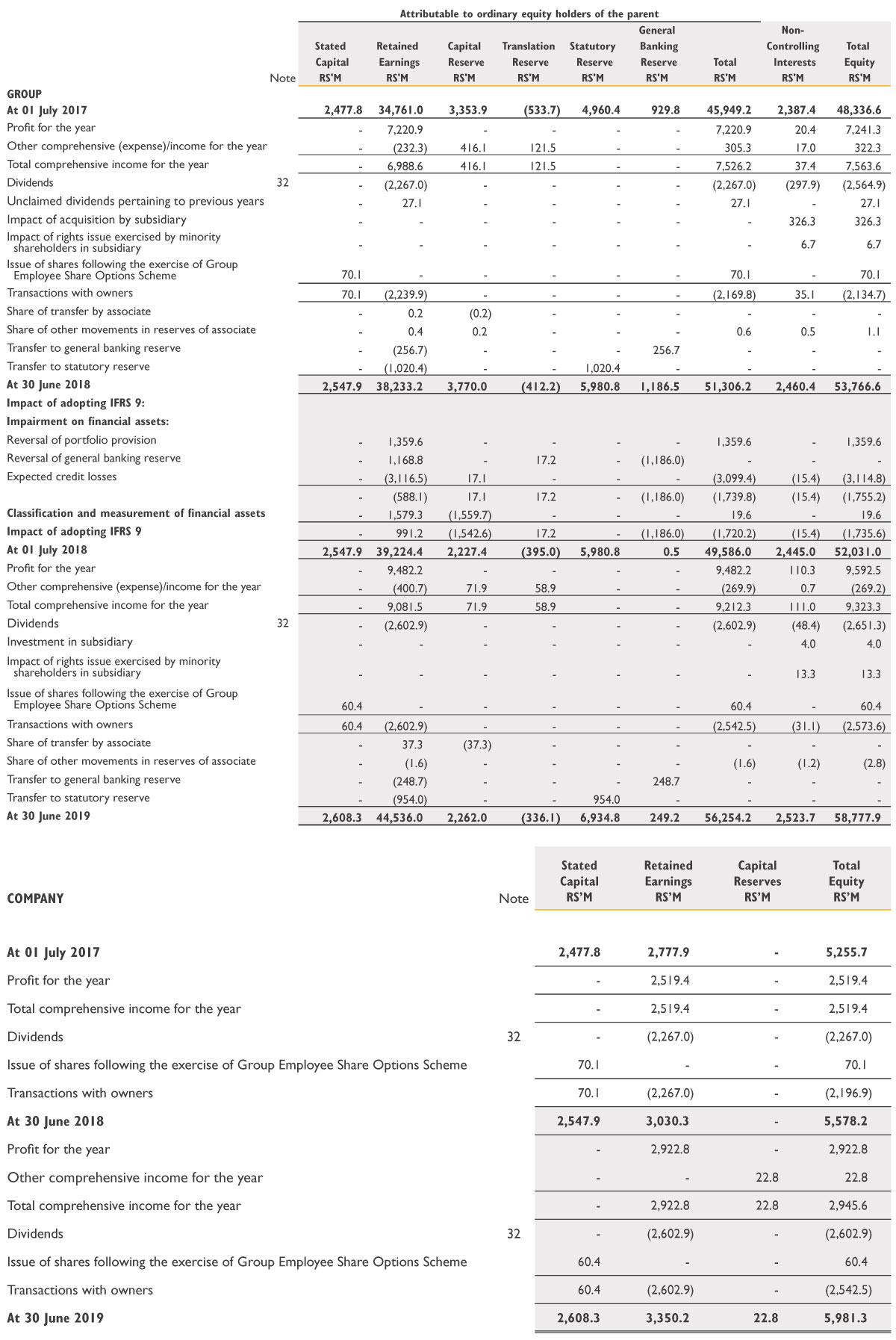
-
Cash Flow
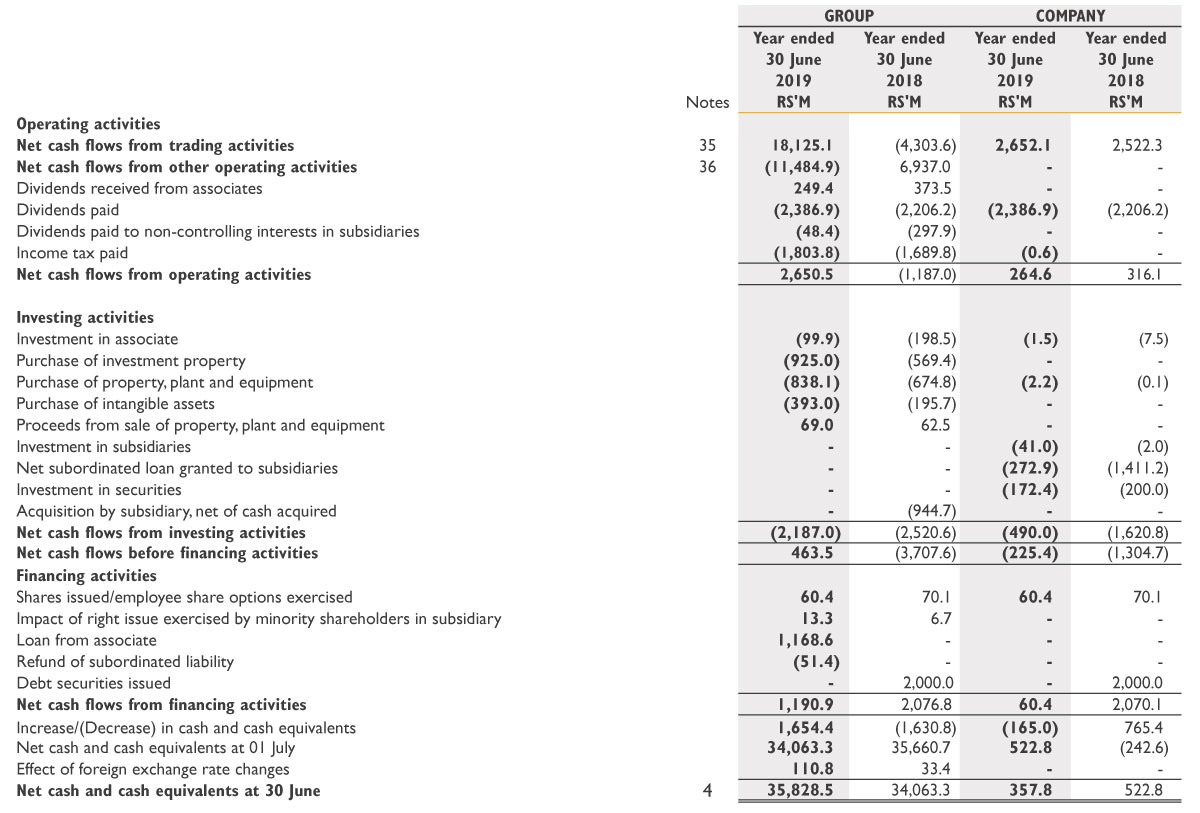
These financial statements were approved for issue by the Board of Directors on the 27 September 2019.
Pierre Guy NOEL
Director
Chief Executive
Didier HAREL
Director
Chairperson
Alain REY
Director
Chairperson Audit Committee
The notes on pages 208 to 299 form part of these financial statements. Auditor’s report on pages 188 to 194.
General Information
The MCB Group Limited (“the Company”) was incorporated as a public company limited by shares on 05 August 2013. Its registered office is situated at 9-15, Sir William Newton Street, Port-Louis, Mauritius.
The Company is listed on The Stock Exchange of Mauritius Ltd.
The main activities of the Company and those of its subsidiaries (“the Group”) consist in providing a whole range of banking and financial services in the Indian Ocean region and beyond.
Index to notes to the financial statements
2019 in Retrospect

SEMYIA
The Loreto College of Mahébourg won the SEM Young Investor Award (SEMYIA) 2019. 151 teams from 85 colleges took part in the competition this year.

"Launch of the Lokal Is Beautiful Scheme
The Lokal Is Beautiful Scheme aims at improving access to finance for responsible Mauritian entrepreneurs.

InovApp Challenge 2019
MCB organised the second edition of the MCB InovApp Challenge, targeting the developer community to bring together digital talents

MCB Foundation Laureate
Shipra Poonyth wins the 31st MCB Foundation Scholarship. She is currently in Australia, undertaking a Bachelor of Commerce with a specialisation in Actuarial Studies, at the University of Melbourne.

National Spelling Bee Competition
The finals of the 18th edition of the National Spelling Bee Competition were held at MCB St Jean. This competition, which is open to students from Grade 7 to Grade 10, is organised each year by the English Speaking Union with the support of MCB Group

Diya One
An official partnership between the MCB Group, Partnering Robotics Ltd and the State Investment Corporation (SIC) is set to trigger the production of Diya One robots in Mauritius.

Science Quest
The Lycée des Mascareignes, Royal College Curepipe and Loreto College Bambous Virieux distinguished themselves at the Science Quest 2019. Organised by the Rajiv Gandhi Science Center and sponsored by MCB Group, this competition has reached its sixth edition this year.

VIBE Moris®
This song competition, which is so much more than a show, reveals and nurtures stage-related professionals.

Launching of MCB IF
MCB Group and Uniciti Education Hub have launched the MCB Institute of Finance (MCB IF). This institute aims to provide specialised and continuous learning to students and professionals from the banking and financial sectors.

Rodrigues Scholarship
Jeaneen Momus and Jonaël Jolicoeur were the laureates of the 2019 MCB Rodrigues Scholarship.

Lokal Is Beautiful
MCB Group presented the results of a study aimed at identifying economic leaks and proposing related solutions. This study was the first concrete proof of the Group’s commitment to sustainable development through its “Success Beyond Numbers” manifesto

Mauritius at the World Trail Championships
Through its partnership with Rando Trail & Nature, MCB has sponsored the national team for Mauritius’s first participation at the World Trail Championships in Portugal

Madagascar UTOP
For the last years, MCB Madagascar has been sponsoring the 70km race of the Ultra Trail des Ô Plateaux (UTOP). This annual event attracts local athletes as well as runners from the whole world

MCB Live
The 2018 edition of MCB Live at the Swami Vivekanda International Convention Centre was the ideal occasion to share the Group’s strategic intentions, as well as its vision in terms of sustainable development.

Madagascar Invitational
The MCB Madagascar Invitational was held at the Golf du Rova in Antananarivo. The winners, accompanied by Jean Michel Ng Tseung, Chief Executive of MCB Investment Holding Ltd, will represent Madagascar at the Constance Pro Am of the MCB Tour Championship.

The Aldabra Clean Up Project in Seychelles
The MCB Seychelles team has been actively participating in the removal of plastic waste from the beautiful atoll. The Aldabra Clean Up Project’s aim is to clear and sustainably manage accumulated ocean waste from the Aldabra Atoll and to increase awareness of plastic pollution in oceans.

APDA youngsters at the golf
During school holidays, children from the Association des Parents des Déficients auditifs (APDA) were able to learn all about golf. They also had a special session with players from MCB.

Chess in School
Chess in School initiative, with the support of MCB Group, is an ideal educational tool for primary school children. It aims to spur their intellect, personality and character.

MCB Seychelles supports athletes
MCB Seychelles was the proud sponsor of Team Seychelles for the Indian Ocean Island Games.

Team MCB at the IOIG
Team MCB went for gold and outshone competitors at the Indian Ocean Island Games.

MCB partners with the Mauritian Wildlife Foundation
MCB has set up an impactful partnership with the Mauritian Wildlife Foundation in order to protect Mauritius’ biodiversity. This partnership also brings in the participation of MCB’s customers.

Plogging in the city
MCB’s first plogging event was held in Les Salines and was a big success. Within a single hour, participants had gathered half a ton of waste
© 2019 MCB GROUP LTD #Success Beyond Numbers

